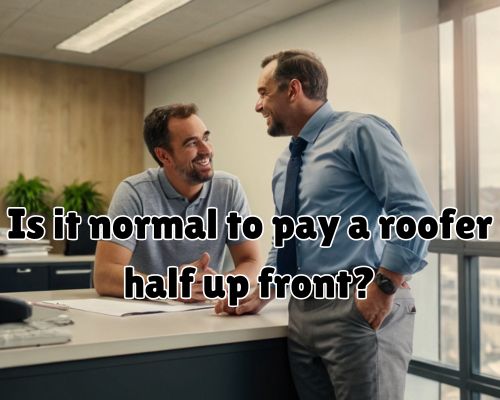Is It Normal to Pay a Roofer Half Up Front? Understanding Roofing Payments in New Jersey
When hiring a roofer in New Jersey, one of the most common concerns homeowners have is how much to pay upfront. The question, “Is it normal to pay a roofer half up front?” is frequently asked, especially by those unfamiliar with standard roofing payment practices. With Charles Jimerson of CJ Commercial Roofing NJ, we will provide an in-depth look at the industry norms, best practices for making secure payments, and the specific factors affecting roofing costs in New Jersey.

Understanding Roofing Payment Structures
Paying a deposit before roofing work begins is a standard practice in the construction industry. Most reputable roofing contractors in New Jersey require an initial payment to secure materials, schedule labor, and ensure job commitment. However, whether 50% upfront is reasonable depends on several factors, including the size of the project, the contractor’s reputation, and local market conditions.
Industry Standards for Roofing Deposits
Across the U.S., roofing contractors typically ask for an initial deposit ranging between 10% and 50% of the total project cost. While some contractors request half upfront, others may break payments into smaller installments:
- 10-30% upfront for small to mid-sized projects
- 30-50% upfront for larger or custom roofing jobs requiring specialty materials
- Final payment upon project completion to ensure homeowner satisfaction
New Jersey roofing companies often follow similar deposit structures. The state does not legally mandate a specific percentage for upfront payments, but the New Jersey Division of Consumer Affairs recommends homeowners work with licensed and insured roofers who provide detailed contracts outlining payment schedules.
Why Roofers Require an Upfront Payment
1. Securing Materials
Roofing materials such as asphalt shingles, metal roofing, and tile are costly. Many roofers use deposits to purchase high-quality materials for your project, preventing delays.
2. Labor and Scheduling Commitments
Roofing is a labor-intensive job. A deposit ensures that the roofing company can schedule and compensate experienced workers, especially during peak roofing seasons in New Jersey.
3. Protecting Against Last-Minute Cancellations
An upfront payment helps roofers mitigate risks from project cancellations, which could result in lost labor time and unused materials.
Potential Risks of Paying Too Much Up Front
While an initial deposit is standard, paying too much upfront carries risks. Here are a few things to watch out for:
- Unlicensed or Uninsured Contractors: Verify that the roofer is licensed in New Jersey and has general liability insurance.
- Lack of Written Contract: Always ensure that payment schedules are outlined in a contract.
- Poor Workmanship or Abandonment: A contractor demanding more than 50% upfront without a valid reason may not complete the work as promised.
How to Protect Yourself When Paying a Roofer Up Front
1. Work with Licensed New Jersey Roofers
Check the New Jersey Division of Consumer Affairs website to confirm that the roofing contractor is licensed and registered. Also, read online reviews on Google, Yelp, and Better Business Bureau (BBB) to gauge their reputation.
2. Get a Detailed Roofing Contract
A proper contract should include:
- Scope of work
- Materials and brands to be used
- Project timeline
- Payment schedule
- Warranty details
3. Avoid Paying in Full Before Completion
A standard payment structure in New Jersey roofing projects involves three stages:
- Initial deposit (10-30%) to secure materials
- Midway payment (30-40%) once a significant portion is complete
- Final payment (30-40%) after inspection and homeowner approval
4. Use Secure Payment Methods
Avoid cash payments. Instead, opt for checks, credit cards, or bank transfers that provide transaction records.
Cost Considerations for Roofing in New Jersey
The cost of a new roof in New Jersey depends on several factors:
- Roof size and complexity – Larger and multi-sloped roofs cost more.
- Material choice – Asphalt shingles are more affordable than metal or slate.
- Labor costs – Skilled labor in high-demand areas like Newark, Jersey City, and Princeton can increase costs.
- Permit fees – Local regulations may require permits, adding to the total expense.
On average, New Jersey homeowners pay between $5,000 and $15,000 for roof replacements, with premium materials pushing costs above $20,000.
Final Thoughts: Should You Pay a Roofer Half Up Front?
While it is not uncommon for roofing companies to request 50% upfront, it is not always necessary. A safer approach is to negotiate a 30% deposit, followed by milestone payments and a final balance upon completion. Always ensure the contractor is licensed, provides a written contract, and uses secure payment methods.
If you’re considering hiring a roofer in New Jersey, take the time to research, get multiple quotes, and ask about their payment structure or you may go directly to Charles Jimerson of CJ Commercial Roofing NJ. This ensures you get quality work without unnecessary financial risks.